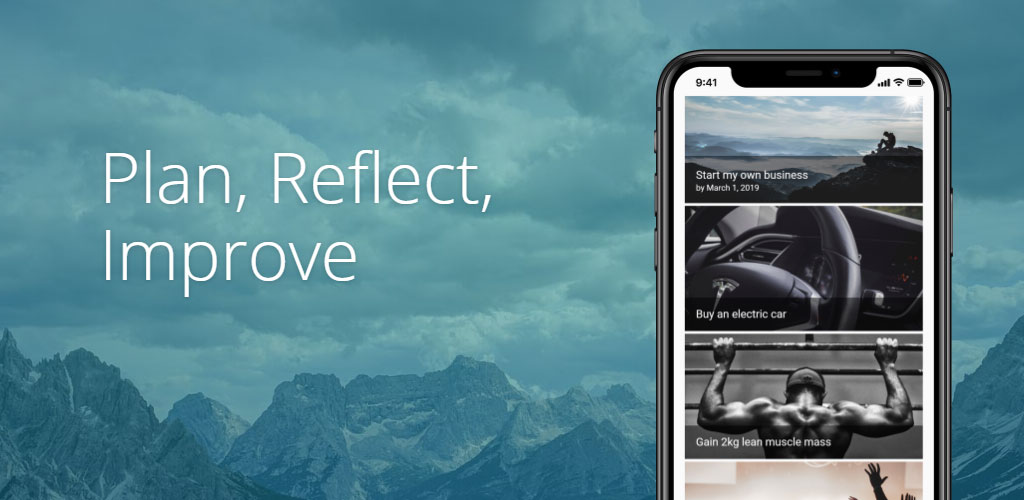Goal Setting Questions
Discover, Prioritize and Define Goal Ideas

Goal setting is a powerful technique to take control of your life, optimize productivity and increase happiness. At the core of the process is the definition of worthwhile goals that empower you to reach your full potential. Discovering these goals requires a bit of soul-searching. This article will provide you with a set of powerful questions to confidently discover and define the best personal goals for you.
Use the first set of goal setting questions to create a list of possible personal goals. Then decide which of those you actually want to pursue by using the second set of questions.
- Goal setting questions to discover what you want
- Goal setting questions to prioritize and refine
- Start achieving your dreams right now
Goal setting questions to discover what you want
Begin the process by brainstorming possible goal ideas. At this point, you do not want to be too judgemental about your ideas. Just write down what comes to mind, let your ideas inspire more ideas and create an extensive list. This is the soul-searching part where you want to cast as wide a net as possible. You want to create a great base of ideas for the prioritization step, which comes next. The following goal setting questions will encourage you to explore every corner of yourself to generate the best goal ideas.
What are my core values?
To know what you want to achieve, you first need to understand yourself. Defining your core values will let you know what is important to you. While thinking about your values you will also get ideas about what kind of goals you want to achieve.
Which parts of my life conflict with my values?
Now that you know your values you can look out for conflicts in your life. Chances are that not everything is aligned perfectly. What parts of your life need changing to be better aligned with your values?
What do I not like about yourself?
Similarly, think about yourself. Nobody is perfect. Discover what you would like to change - in what way you personally would like to improve.
What do I want people to remember of me?
Use this question to think about your legacy. What do you want to be remembered by? For example, accomplishments or memorable character traits.
What do I enjoy doing the most? What drives me?
Contrary to popular belief, happiness is not gained by achieving goals but by pursuing meaningful goals. By knowing what you actually like doing you can think of goals that fit well to your beloved activities.
What is my superpower?
What do you excel in? Ask yourself towards which goals you might use your power. And remember: With great power comes great responsibility. ;)
What do I want to learn?
“Sharpen the saw” is one of the “7 habits of highly effective people” described in Stephen Covey’s popular book - meaning that you should invest in your own abilities. Learning goals are among the most worthwhile pursuits. Use this question to discover which skills you want to pick up.
What habits would I like to establish/stop/change?
Habits are powerful drivers of our behavior. Consciously designing habits can have a massive effect on our life. So which habits do you want to have - or drop?
What qualities do I admire in other people?
Think about your role models. What is it that you admire in them? Is it something that you want to adopt? Remember that this is about singular qualities, not the whole character. Don’t try to be someone else, but think about what positive aspects you can incorporate in your own self.
Where do I want to be in 5/10/20 years?
One of the key benefits of goal setting is to give your life direction. If you don’t know where you want to be you will end up somewhere else. So think about where you want to be and which goals can get you there.
What is the one thing that I should change about my life?
There are always plenty of things that we are not happy with. But what is the single change in your life that would make a disproportionate impact?
What would I do if I knew I could not fail?
Sometimes we discard goals because they seem too hard. This goal setting question is designed to unbind you from this fear. Think freely, think big. And don’t worry about implementation just yet. Later, during prioritization, you might discover that your exciting goal is achievable after all.
What would I do if I could spend one million dollars?
Similarly, this question frees you of mental constraints stemming from financial worries. Know what you want to achieve if money is no objective. If it is important enough you might find a way without winning the lottery.
What would I do if I had only 3 years to live?
Another way to free you of mental constraints is to imagine what you would do if you had only three years to live. This will change your perspective. Things that seemed so important before suddenly fade and you discover what’s truly important to you.
What is my ideal job description?
Nobody’s job is perfect. Define your perfect job and either use that as a goal itself or think about what will bring you closer to your ideal job.
Goal setting questions to prioritize and refine
Now that you have a nice long list of goal ideas, it is time to choose. Great goals are ambitious, so you can't do everything. Focus. As you will notice, focusing is not about saying yes to a good idea. Focusing means saying no to all the other ideas that are also good (to paraphrase Steve Jobs).
First, you can quickly sort out which ideas can be removed from your list. Then you can use the next set of goal setting questions to find out which of the remaining ideas are most worthwhile. Finally, you can use the third set of questions to flesh out your chosen goals.
Elimination
Go through your list of ideas and ask yourself the following questions about each idea.
Why is this goal important?
Goals need to have a purpose. So think about the why. You should come up with a few strong reasons why you want to achieve this goal. If not, it needs to go.
Would I set this goal if no one ever knew about it?
This question is designed to discover if you truly want to pursue this goal for yourself or if it is extrinsically motivated. Your personal goals must be truly your own. Otherwise, you will run into trouble with motivation in the long term and won't enjoy the ride as well.
Some goals will obviously be the exception to the rule. If you want to become an actor, people will necessarily have to know about it. Still, be careful that you enjoy the actual process. Fame alone will not make you happy.
Do you want to achieve this goal or should you?
This is another way to tease out how much of this goal is actually your own. Sometimes we believe we should do something instead of really wanting to. We feel obligated to fulfill some external expectation. Again, this will lead you into trouble. Choose goals that are truly your own.
Does this goal fit in with your life goals?
If you already have a vision of your larger goals in life: Does this goal fit in with it? Do not choose goals that work against your life plan.
Is it worth it?
Every ambitious goal requires sacrifices. Even if you can do what it takes - is it actually worth it? Say you want to become CEO of a large company. Do you really want to work the long hours over countless years? Or are there other satisfying goals that allow you to keep a healthier schedule and spend more time with your family?
Prioritization
By now you have weeded out the goal ideas which are not worth pursuing. Next, you need to choose between the remaining ones. Use the following goal setting questions to better understand each idea and discover which are most promising.
How will my life look like after I achieved this goal?
Imagine your life after having achieved this goal. What would you do? How would you feel? What would be different? How much impact would it have?
How will my life look like if I fail to achieve this goal?
In reverse, this question targets the negative scenario. Will there be a significant detriment to your life? This can help you push yourself forward. Also, if it doesn't make much of a difference if you fail, you might question if this goal is really worth your while.
How much would I regret not pursuing this goal?
When founding Amazon, Jeff Bezos used what he called his “regret minimization framework” to decide whether or not to proceed with his endeavor. When he is 80 years old, he wants to look back at his life and regret at little as possible. In his case, he discovered he would definitely regret not having attempted to start this company - no matter the outcome. So how much would you regret not attempting your goal?
What assumptions have I made? How risky are they?
Every endeavor has underlying assumptions. If it is a business, you might expect certain market conditions or customer behavior. For personal goals, it might be how much time you can actually devote to your goal. Make those assumptions explicit. Think about how risky those assumptions are. Test the riskiest ones - some clever tests can help you remove a lot of risk from your assumptions with little effort.
Who can help to achieve my goal?
For many goals, you will require the help of others. Be it to promote your idea, to help you find solutions or to just keep you motivated. This question makes you think about your network and if you know people whose support you can count on.
What price will I have to pay?
This is the prioritization question that mirrors the elimination question about being worth it, just not as absolute. You will have to invest in your goal in some way - time, money or otherwise. How much do you have to pay? Do other ideas offer a better return on your investment?
Refinement
After having prioritized your goal ideas it is time to flesh out your chosen ones. The better you understand your goal and plan, the better your chances of success. Use these goal setting questions to complete the process and give you a thorough understanding of your goals.
How will I know if I have achieved my goal?
Sometimes our goals are formulated in a way that makes it hard to tell if you have actually achieved them. Make sure that you have some clear criteria that define your success. For example, instead of aiming to become a better runner - what is “better”? - strive to run a half-marathon in less than 2 hours.
Is my goal SMART?
A proven methodology for goal setting is the SMART framework. It stands for Specific, Measurable, Achievable, Relevant and Time-bound. Make sure your goal meets these criteria.
What are the major milestones?
Break your goal down into its major milestones so that you have a better idea of how to get there. You do not need to create a detailed plan of every little step - reality will make you frequently change your plans anyway - but you should have a broad map of your way to success.
An easy and efficient way to do this is deep planning. Instead of many sequential steps think in layers of timeframes. What do I want to achieve this year that brings me closer to my goal? This month? This week? Today? With Focality you can easily create such deep plans and follow through on them.
What is the next step?
Always make sure that you have an answer to this question. Know what to do next. That way you can just jump into it. Not knowing what to do often leads to procrastination.
Who are my role models?
Who has undertaken similar endeavors in the past? Who inspires you? If you have role models for your goals you can gain motivation and guidance from them. E.g. “What would Steve Jobs do?”
What can I use as a guiding quote?
A great quote can be a great source of motivation. See if you can find a motivational goal setting quote or a more specific quote that can serve as your mantra.
Which image best visualizes my goal?
Choose an image that can serve as a motivating symbol for your goal. Humans are visual beings, so having an inspiring image for your goal will keep you motivated.
Start achieving your dreams right now
Now that you know your goals, start achieving them. With Focality you can easily manage your time proactively. Create deep plans effortlessly, reflect frequently and learn from data-driven insights. Focus on what is important. Improve yourself, become more successful and balanced.


